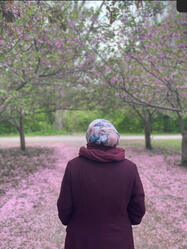|
There are women who are carrying the tremendous load of uplifting entire communities, whether they be family, professional, faith, cultural or other types of communities. The efforts of these women are many times underestimated and underappreciated, especially while many of them have the added physical, mental, emotional and in some cases financial labour of caring for their families.
Over the past few weeks, in commemoration of the #ourlondonfamily tragedy that took place in London Ontario in June 2021, I have seen women as young as 15 take on what they describe as a ‘burden that would crush a mountain, yet they will carry it through strength, compassion and agency’ (Mariam Al-Sabawi, 15, Founding member of Youth Coalition to Combat Islamophobia). I have seen women from all different walks of life, culture, and faith offer tremendous support in the face of navigating feelings of grief and overwhelm themselves. I have seen women reach out to one another and their communities to offer hope and healing. It’s inspiring and humbling. With a global pandemic and online schooling for extended periods of time for women with children, there are added challenges. Due to the pandemic, women are now increasingly experiencing burn out - and in higher rates than men. Women who identify with racialized communities are also more likely to experience microaggressions and behaviour that is othering and not inclusive, given that they are also increasingly involved in equity, diversity and inclusion work (McKinsey and Company, 2021). While many women are not in this type of work for the appreciation, the need for support is universal to all people. This led me to ask myself and several women this question over the past few weeks. For the women carrying our communities, what do you need to stay strong and soft? What do you need for this work to be sustainable and for you to be healthy and well? In response to my question, I received responses that included:
She spoke about the following points: *Community love needs to start with healthy love for oneself. According to the Hadith cited above, she spoke about the importance of centering self care which leads to community care. The need for self-healing which leads to community healing, and the need to create self-safety which creates community safety. And in turn community love, care, healing, and safety will also contribute to self-love, care, healing, and safety and they go hand in hand in a circle. This is how she defined wholeness and how we start moving from surviving to thriving with centering self care by asking 3 questions:
She stresses that part of this equation of loving for others what we love for ourselves is speaking to and treating ourselves kindly because we are a worthy creation of Allah, which is what I may refer to as self-compassion (For more on self compassion, I recommend reading Dr. Kristen Neff’s work). *Being open to help In her lecture, Rehab also shared the importance of surrounding ourselves as much as possible with people who understand and support healing, being open to letting people care for us, to reach out for help, with the understanding the more I give and receive from the community, the healthier we will all be. *How to Respond in the Face of Challenges At times where this is not the case because we will all inevitably be met with challenges when working in the community, her approach entailed thinking: “I see beauty in your heart and I am human like you and I am not going to speak to you in a way that will break your heart, I will leave loving you even if I didn’t love what you did”. The verse that came to mind for me here is “Good and bad cannot be equal. Respond with what is best, then the one you are in a feud with will be like a close friend”. (Quran 41: 34) *The need for Rest vs. Constant Productivity She also shared the need to be comfortable with not being constantly productive. In fact, the need to be constantly ‘busy’ may be a trauma response because we are avoiding sitting with ‘ourselves’ - where there’s healing work to be done. Ultimately, when I think of the resilience needed for the women carrying our communities, according to research on resilience, it’s not only about intrinsic qualities like persistence, it is just as much if not most importantly about drawing on resources and support systems. These resources include spiritual, social, financial, community, physical, environmental, and emotional resources. One person was never meant to carry it all. Even prophets had supports in place. Let’s not place unreasonable expectations on individuals to be superhuman. *Let’s remind each other of our humanity and honour our fragility while understanding our strength comes from An All Compassionate Creator*, as Allah reminds us: “And Allāh wants to lighten for you [your difficulties]; and the human was created weak” (Quran 4:28). Let’s take care of ourselves and take care of each other. Let us raise sons who become men who can support women doing the important work of carrying our communities. Let us love each other as we love ourselves. And let God’s love carry us and each other through it all.
0 Comments
|
Archives
December 2022
Categories |

 RSS Feed
RSS Feed
